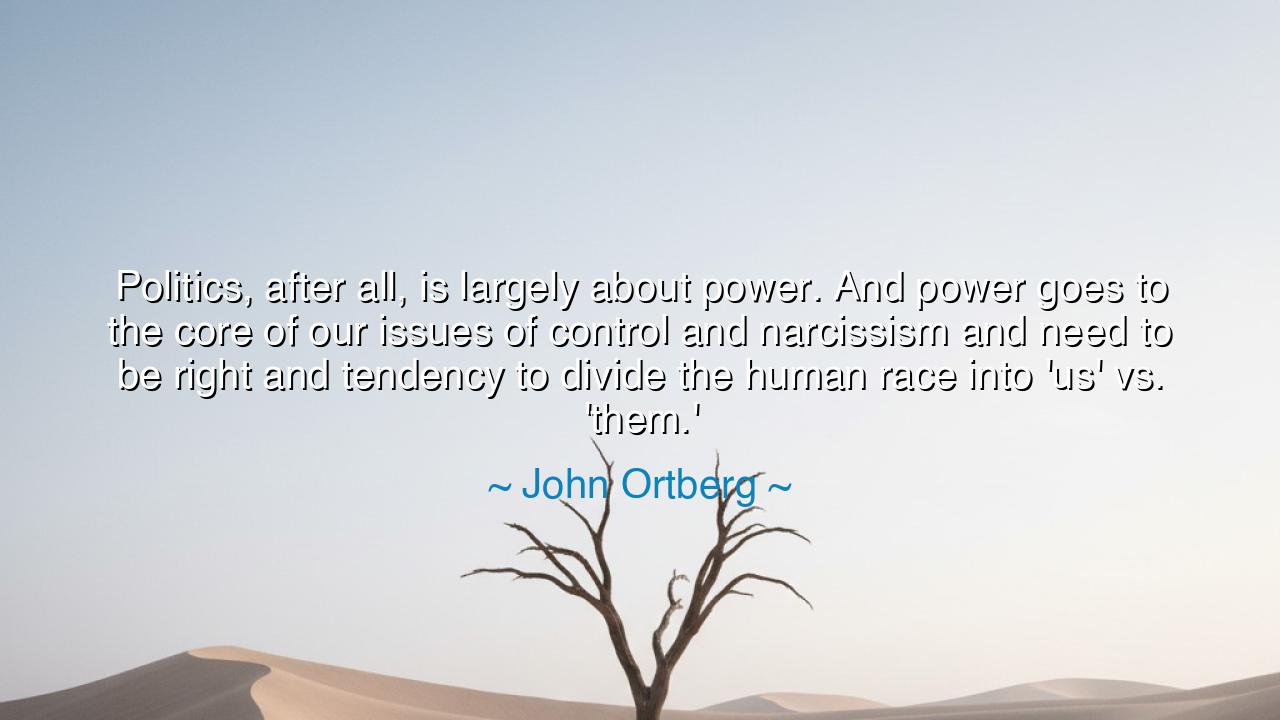
Politics, after all, is largely about power. And power goes to
Politics, after all, is largely about power. And power goes to the core of our issues of control and narcissism and need to be right and tendency to divide the human race into 'us' vs. 'them.'






O children of the future, listen well to the words of the wise John Ortberg, for he spoke of power, that ever-elusive force that stirs the hearts of rulers and subjects alike. He declared, "Politics, after all, is largely about power. And power goes to the core of our issues of control and narcissism and the need to be right and the tendency to divide the human race into 'us' vs. 'them.'" These words, etched in the wisdom of the ages, reveal the nature of politics not as a noble pursuit of justice, but as the battlefield of egos and ambitions.
Behold the truth in his words: at its heart, politics is not merely the negotiation of laws or the protection of the weak, but the struggle for dominance. It is the battle of wills, where the desire to control others is masked in the guise of governance, but beneath the surface lies the drive of narcissism—the hunger to be seen, to be acknowledged, to be in command. This struggle for power does not arise solely from the need to govern, but from the darker, baser instincts of human nature, the need to be right, to shape the world in one's own image, to silence dissent and mold all into the form of one’s own desire.
From the earliest days of history, this hunger for power has divided mankind into camps of us and them. Consider the ancient wars that raged across the lands—whether the Greeks and the Persians, or the Romans and the barbarians—nations cast each other as enemies, painting their adversaries as mere others, unworthy of the same rights or respect. This division has echoed through the ages, from the feudal lords of old to the tyrants of the modern day. The phrase "us vs. them" is as old as the human race, a tool of those who seek to control by othering those who are different, creating a false dichotomy to justify their claim to dominance.
In the vision of Ortberg, we must also see the tendency to be right—for to possess power is not only to control others, but to convince them that one’s will is the only way. Here lies the narcissism of the leader, who believes that their thoughts, their desires, their truths are the only truths worth following. It is a force as old as Alexander the Great, who marched across continents, convinced of his divine right to rule and shape the world in his own vision. His empire crumbled, but his narcissism lived on, for such is the nature of power: it seeks not just control, but validation.
Yet, there is hope in the understanding of this truth. We, the children of the future, can see the traps laid by those who seek dominance and division. We must resist the urge to divide, for in division lies only conflict. Instead, let us remember that true strength lies in unity, in the embracing of others, and in the humility of those who seek to serve rather than to rule. Let us learn from the past, from the great empires and the false rulers, and choose to rise above the hunger for power and control. Let us choose to unite, to recognize the humanity in all, and to build a world where the struggle for dominance is replaced by the embrace of shared humanity.






TTThien Tran
The quote’s mention of the tendency to divide humanity into 'us' vs. 'them' resonates deeply. I often wonder if we, as humans, have evolved to think in these terms due to survival instincts. But in modern politics, it seems like this instinct is manipulated for personal gain. How can we shift away from this binary thinking, especially when it’s so central to the way political ideologies are shaped and communicated?
NPThu ngan Pham
I find the connection between power and control in politics a bit unsettling. It’s like once people enter the political arena, they start seeing everything through the lens of power dynamics. But can power truly be used for the greater good? Is it inevitable that it leads to corruption or division, or can it be channeled in a more constructive way? It's hard to imagine a politics that doesn't involve these elements, but is it possible?
HQPham Huu Quy
It’s fascinating how this quote connects the thirst for power with deeper psychological needs, like narcissism. I wonder though, do you think all political leaders operate out of these tendencies, or are there some who genuinely seek to serve others? Maybe the system itself breeds these issues, where leaders have to prioritize control and self-justification in order to survive in politics.
NTDiem Thanh Nguyen Tran
The idea that politics boils down to 'us vs. them' is really striking. I’ve always felt like a lot of political debate is more about reinforcing tribalism than actually solving issues. How do we get beyond this mentality? Is it even possible, given how ingrained these divides are? It feels like the discourse is more about being on the 'right side' than listening to or understanding each other’s perspectives.
KLKhang Le
This quote seems to touch on some of the darker sides of politics, which is something I've often wondered about. The part about narcissism and the need to be right feels particularly relevant, as we've seen many politicians and their supporters acting from that place rather than for the greater good. Do you think this focus on power ultimately harms societies, or is it just a necessary part of human nature that plays out in politics?